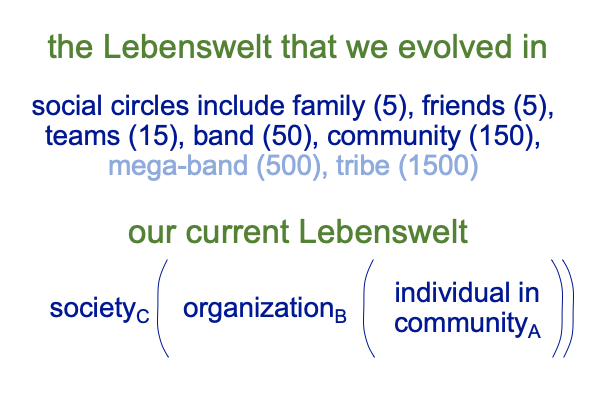0106 Here is a picture of the Lebenswelt that we evolved in compared to our current Lebenswelt.

0107 For evolutionary psychology, orthodox views3a are going to be influenced by hominin adaptations into social circles of the Lebenswelt that we evolved in, even though, in our current Lebenswelt, a differentiated dynamic is in play. Indeed, social construction(3a)2aC, along with critical theory(3b)2aC and social justice(3c)2ab, constitute an organizational objective2aC in the societyC tier that interpellates individuals in communityA to enter organizationsB, either willingly (by voluntarily identifying onself as “oppressed”(2b)2aC) or unwillingly (by involuntarily being assigned the label of “oppressor”(2b)2aC).
0108 Professor Saad does not touch on the above, because this discussion extends beyond his expertise in evolutionary psychology pertinent to consumer behaviors.
These comments add value to Dr. Saad’s argument by explicitly posing how social construction(3a)2aC (which applies to our current Lebenswelt) cannot fully exclude evolutionary psychology3b (which applies lessons about the Lebenswelt that we evolved in to our current Lebenswelt).
0109 What if human will in our current Lebenswelt is influenced by innate tendencies that are adaptations to the Lebenswelt that we evolved in?
Then, social constructivism3a should not ignore that reality (rather than displace that reality beneath its own occupation of the content level of inquiry).
Then, critical theory3b cannot situate the actuality of identity as personal choice2a according to the potential of a system1bunderlying a manichaean division between “oppressed”2b and “oppressor”2b.
Also, social justice(3c)2aC cannot properly contextualize the division between “oppressed”(2b)2aC and “oppressor”(2b)2aC with the potential of protection(1c)2aC, because the demand for protection(1c)2aC may itself be an innate adaptive response to the existence of a system(1b)2aC that pretends to be an evolved social circle.
